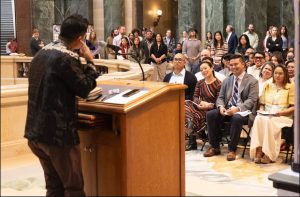A doctoral candidate in the School of Education was recently invited to speak at the state Capitol in recognition of Filipino American History Month.
Tony DelaRosa, a doctoral candidate in the Department of Educational Leadership and Policy Analysis, was invited by state Rep. Angelito Tenorio, Wisconsin’s first Filipino American legislator, to speak at an October event in the Capitol rotunda. The event recognized Wisconsin’s first official observance of Filipino American History Month — a milestone following the state Legislature’s formal resolution earlier this year. October holds particular significance for Filipino Americans, as Oct.18, 1587, marks the first recorded landing of Filipinos in Morro Bay, California during the Spanish Galleon trade.

DelaRosa is a critical Filipinx American scholar and educator and co-leads the USAP Tayo Lab on Filipino American Politics and Well-being at UW–Madison’s Center for Healthy Minds. His research focuses on how ethnic studies and race-based policies and theories in education translate into effective practice grounded in a lens of Asian American and Filipino American critical theory. His debut book, “Teaching the Invisible Race,” was a finalist for the 2024 Next Generation Indie Book Awards and a 2024 IPPY Silver Medal Awardee. In his remarks, DelaRosa spoke about the importance of visibility and the role that recognition plays in shaping inclusive education and community belonging.

He connected this recognition to Wisconsin’s Act 266, which mandates the inclusion of Hmong and Asian American studies in K–12 curriculum statewide. DelaRosa emphasized that this progress invites further reflection and action, encouraging the audience to imagine what Filipino American history education might look like for Wisconsin students.
“Let us leave with a hungry imagination — what else?” DelaRosa asked. “What does a unit on Filipino American history look like for Wisconsin? How can Wisconsin highlight our histories of resistance, resilience, and cultural wealth?”
The event drew members of the Filipino American community, educators, and state leaders to honor the past and envision a more inclusive future for Wisconsin classrooms.